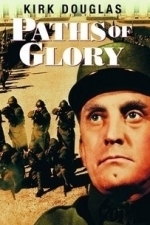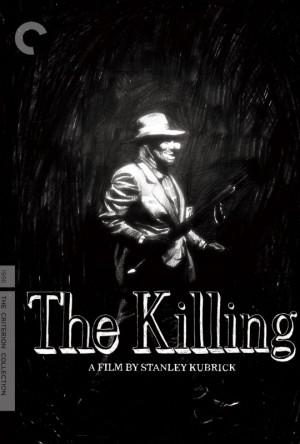Search
Search results
Alec Baldwin recommended Paths of Glory (1957) in Movies (curated)
Pat Healy recommended The Killing (1956) in Movies (curated)
Pat Healy recommended Paths of Glory (1957) in Movies (curated)
BankofMarquis (1832 KP) rated Paths of Glory (1957) in Movies
Feb 18, 2024
Early Kubrick Masterpiece
Dore Schary, then head of production of MGM, like Stanley Kubrick’s first film, THE KILLING (1956) so he hired Kubrick to develop film stories from the studios pile of scripts and purchased novels. Finding nothing the he liked, Kubrick remembered reading Humprhey Cobb’s anti-war novel PATHS OF GLORY and suggested that. Schary (like every other studio exec in Hollywood at the time) turned down the opportunity to make this bleak anti-war film.
When Schary was fired by MGM, Kubrick went to Kirk Douglas (who liked THE KILLING as well and was anxious to work with Kubrick). Using his clout as one of the Major Stars of Hollywood at the time, Douglas got United Artists to agree to make the picture.
Starring Douglas, PATHS OF GLORY tells the WWI tale of a group of soldiers who mutiny when asked to take on a suicide mission to take the impregnable “ANTHILL”.
In this film, Kubrick starts to come into his own as a unique and visionary filmmaker who would insist on take after take until he got the exact shot he was looking for.
The highlight of the film is the 5 minute tracking shot of the troops attacking the Anthill, a tracking shot that films such as SAVING PRIVATE RYAN and 1917 owe a debt to. It is a masterclass of filmmaking from Kubrick.
As for Douglas – who was also used to having complete control of his films – PATHS OF GLORY was a battle of wills between Kubrick and Douglas with each man coming out on top (at times)…to the betterment of the film.
On the acting front, Douglas has never been better as the Commander of the unit that has the mutiny and who decides to defend the soldiers who are on trial for mutiny and cowardice and who quickly realizes that the trial is a sham and that there is no way for him these soldiers to get a fair trial.
Adolph Menjou (the 1937 version of A STAR IS BORN) and George Macready (GILDA) are appropriately blustery and out-of-touch as the Senior Officers who give (and then defend) their impossible orders. Richard Anderson (Oscar in the SIX MILLION DOLLAR MAN) is slimey and slippery as the prosecuting attorney (who knows that the outcome of the trial is a done-deal) while Ralph Meeker (THE DIRTY DOZEN), Joe Turkel (the bartender in THE SHINING) and Timothy Carey (who famously clashed with Kubrick during filming in a calculated attempt to get some publicity for himself and was subsequently fired from the film) are the unfortunate 3 who are put on trial as representatives of their troops while the outstanding performance in this film is fomer child actor Wayne Morris (KID GALAHAD) as drunken Lt. Roget.
Even though this film is about ½ war battle film and ½ a court-room drama, it is the visuals of the folly of war that will stick with the audience long after it is over…and stick with it it does as this film was selected for preservation in the United States Film Registry in 1992 and is still listed in IMDB’s TOP 100 Rated films.
Letter Grade A-
8 stars (out of 10) and you can take that to the Bank(ofMarquis)
When Schary was fired by MGM, Kubrick went to Kirk Douglas (who liked THE KILLING as well and was anxious to work with Kubrick). Using his clout as one of the Major Stars of Hollywood at the time, Douglas got United Artists to agree to make the picture.
Starring Douglas, PATHS OF GLORY tells the WWI tale of a group of soldiers who mutiny when asked to take on a suicide mission to take the impregnable “ANTHILL”.
In this film, Kubrick starts to come into his own as a unique and visionary filmmaker who would insist on take after take until he got the exact shot he was looking for.
The highlight of the film is the 5 minute tracking shot of the troops attacking the Anthill, a tracking shot that films such as SAVING PRIVATE RYAN and 1917 owe a debt to. It is a masterclass of filmmaking from Kubrick.
As for Douglas – who was also used to having complete control of his films – PATHS OF GLORY was a battle of wills between Kubrick and Douglas with each man coming out on top (at times)…to the betterment of the film.
On the acting front, Douglas has never been better as the Commander of the unit that has the mutiny and who decides to defend the soldiers who are on trial for mutiny and cowardice and who quickly realizes that the trial is a sham and that there is no way for him these soldiers to get a fair trial.
Adolph Menjou (the 1937 version of A STAR IS BORN) and George Macready (GILDA) are appropriately blustery and out-of-touch as the Senior Officers who give (and then defend) their impossible orders. Richard Anderson (Oscar in the SIX MILLION DOLLAR MAN) is slimey and slippery as the prosecuting attorney (who knows that the outcome of the trial is a done-deal) while Ralph Meeker (THE DIRTY DOZEN), Joe Turkel (the bartender in THE SHINING) and Timothy Carey (who famously clashed with Kubrick during filming in a calculated attempt to get some publicity for himself and was subsequently fired from the film) are the unfortunate 3 who are put on trial as representatives of their troops while the outstanding performance in this film is fomer child actor Wayne Morris (KID GALAHAD) as drunken Lt. Roget.
Even though this film is about ½ war battle film and ½ a court-room drama, it is the visuals of the folly of war that will stick with the audience long after it is over…and stick with it it does as this film was selected for preservation in the United States Film Registry in 1992 and is still listed in IMDB’s TOP 100 Rated films.
Letter Grade A-
8 stars (out of 10) and you can take that to the Bank(ofMarquis)

